The issue of abortion in this election has created an agonizing dilemma for many Christians. A number of our readers have written us to express their anguish over it and to encourage us to deal more directly with the problem in Sojourners.
We, too, have struggled with the political and moral dilemma of abortion in this election campaign. We find no easy answers or clear choices, only difficult questions. Our readers have sensitized us further, as they often do, to the depth of these questions.
At Sojourners we hold the conviction that abortion is morally wrong; we believe abortion to be a great social evil that must be abolished. We attempt to take a consistent pro-life stance that regards all lives as precious and seeks to defend life everywhere and anywhere it is threatened, either by weapons of war, abortion clinics, electric chairs, or the specter of poverty.
We do not yet have a clear or satisfying position on the complicated question of abortion legislation. While we are not "pro-choice," we find the anti-abortion legislation currently offered to be quite offensive in its obvious biases against women and the poor. We are searching for a way out of the political and legal impasse in which we now find ourselves, and that makes the abortion question especially difficult as a focused election issue. An alternative is desperately needed, and we are ready to work with other frustrated, pro-life people to try to find one.
Read the Full Article

